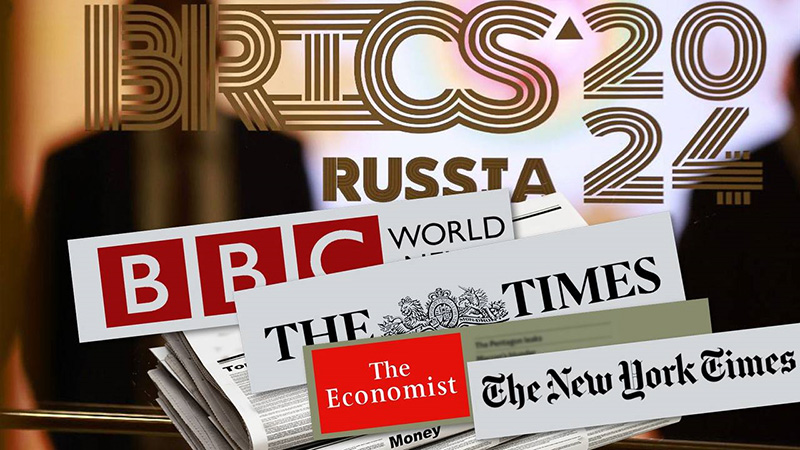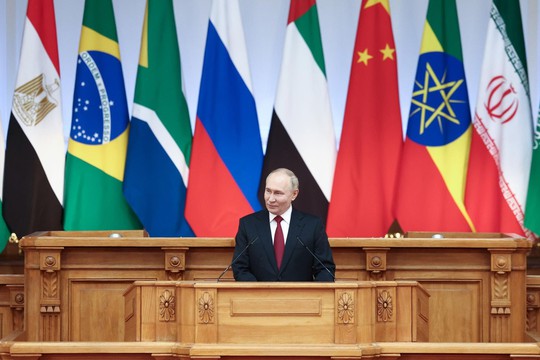Vladimir Putin against the background of the flags of the BRICS member countries.
Photo: RIA.ru
The three-day BRICS summit, started Tuesday in the Russian city of Kazan, is the first meeting of the group of major emerging economies Brazil, Russia, India, China and South Africa since it expanded earlier this year to include Egypt, United Arab Emirates, Saudi Arabia, Ethiopia and Iran.
Leaders to attend include China’s Xi Jinping, India’s Narendra Modi, Iran’s Masoud Pezeshkian, South Africa’s Cyril Ramaphosa as well as those from outside the club, like Turkish President Recep Tayyip Erdogan. Brazilian President Luiz Inacio Lula da Silva was expected to join but canceled his trip after suffering an injury at home.
Set to be by far the largest international gathering the Russian president Vladimir Putin has hosted since the February 2022, the gathering of BRICS and other countries this week spotlights a growing convergence of nations who hope to see a shift in the global balance of power and – in the case of some, like Moscow, Beijing and Tehran – directly counter the United States-led West, CNN stresses.
It’s this latter message that Putin – and close partner and most powerful BRICS country leader Xi – will project in the coming days: it’s the West that stands isolated in the world with its sanctions and alliances, while a “global majority” of countries support their bid to challenge American global leadership.
In remarks to reporters Friday, Putin hailed the growing economic and political clout of BRICS countries as an “undeniable fact” and said that if BRICS and interested countries work together, they “will be a substantial element of the new world order” – though he denied the group was an “anti-Western alliance.”
Putin’s messaging this week will be all the more poignant as the meeting comes just days ahead of the US elections, where a potential victory for former President Donald Trump could see the US shift its staunch support of Ukraine and strain Washington’s ties with its traditional allies more broadly.
The message will be: how can you talk about Russia’s global isolation when (all these) leaders are coming to Kazan.
This year, the Russian president is at the helm of the first summit since the organization nearly doubled in size – and the gathering is playing out before a very different global landscape.
While BRICS is primarily geared toward economic collaboration, its meeting last year took place in the shadow of the war in Ukraine. Now, even as that war rages on, the expanding conflict in the Middle East, where Israel is fighting Iran’s proxies, is also likely to dominate leaders’ conversations.
Putin last week confirmed that Palestinian leader Mahmoud Abbas would join the event. The Russian leader and his officials will likely use the conflict – and the anger across the Global South toward the US and its support for Israel – to press his argument for a new world order without the US at the helm, observers say.
China and Russia have both called for a ceasefire in the spiraling conflict and criticized Israel’s actions, while the US has endorsed Israel’s right to retaliate against militant groups Hamas in Gaza and Hezbollah in Lebanon.
Many attending the summit see the conflict in the Middle East “as a prime example of why this particular grouping of countries should have more influence,” said Jonathan Fulton, an Abu Dhabi-based senior non-resident fellow at the Atlantic Council.
Observers will also be watching whether China and Brazil use the gathering as a platform to play up their joint six-point peace proposal on the war in Ukraine, as they did at last month’s meeting of the United Nations General Assembly.
The gathering in Kazan also gives Putin ample opportunity for one-on-one facetime with his fellow BRICS leaders and other friendly dignitaries in attendance.
Leaders over the next few days are expected to discuss how to advance on-going efforts to settle payments outside the US dollar-denominated system using BRICS currencies and banking networks, a system that could have economic benefits, but also helps member countries like Russia circumnavigate Western sanctions. The countries are also likely to look for ways to boost economic, technological and financial cooperation across a range of areas from energy to sharing satellite data.
Today, even as BRICS has again expanded – and the Kremlin says more than 30 additional countries are interested in joining or cooperating with it – deepening geopolitical fault lines further complicate BRICS’ identity and direction, observers say.
“China and Russia have essentially tried to shift the group from the sense of BRICS being emerging economies to potentially being some sort of an expression of angst with regard to Western dominance,” said Manoj Kewalramani, who heads Indo-Pacific studies at the Takshashila Institution research center in the Indian city of Bangalore.
And new or aspiring members may not be wanting to choose between this vision or the West. Instead, they are looking to grow their economies and “engage non-ideologically and pragmatically,” he said.

The international press is paying a lot of attention to the BRICS summit
"This club cannot stand the lessons in morality and democracy that are constantly taught by Western leaders, whom it considers arrogant, hypocritical and advocates of double standards. Among these bad manners of the West, the most disgusting in the eyes of the BRICS countries are trade sanctions. They are considered illegal measures that contradict the UN Charter, which, according to the BRICS countries, gives the right to impose sanctions only to the United Nations. China will use the summit in Kazan to promote its strategy of de-dollarization of international trade. Its dream is to replace the dominance of the dollar as an instrument of international settlements, since the use of the dollar allows the Americans to monitor all financial and commercial transactions in the world."
One area in which the group, led by China, has been particularly active is money. Dethroning the dollar has been, and will remain, a central goal of BRICS; last year’s summit concluded with the explicit mission of drafting a blueprint to make that a reality.
BRICS members have different beefs with the centrality of the dollar, which serves to unify them for now but which also highlights the fissures just waiting to widen. For some, such as China, Russia, and Iran, an alternative to the dollar means a way to sanction-proof their economies.
Russia and Iran are already under siege, and China has spent the last several years buttressing its financial ramparts.
Because the dollar remains the most used currency for cross-border trade, and the main currency in central bank vaults, and because U.S. banks ultimately take part in almost every dollar transaction, the reach of U.S. sanctions is global and crushing. Russia and China haven’t spent the last few years building alternatives to Western payment systems out of altruism. They are building escape pods.
The other BRICS members also bristle at the dollar’s dominance but not because they fear sanctions per se (though some, such as Ethiopia, do as well). What they worry about is that the dollar dominates their economic life and they have no say over it. Many are commodity exporters and have little choice but to trade in dollars, since commodity markets remain dollar-denominated. A shortage of dollars can paralyze trade and poleax public finances. All are exposed to the vagaries of U.S. Federal Reserve interest rate decisions that can make their money worth less, their inflation higher, their capital balances redlined, and their debt unsustainable.
Brookings Institution experts:
For years, Western policymakers have largely dismissed BRICS as more bark than bite. But it is not a good idea to take BRICS lightly — if nothing else, for the political symbolism surrounding the upcoming meeting in Kazan, Russia. Who would have thought that Russian President Vladimir Putin would be hosting a summit attended by dozens, including U.S. partners like Egypt and NATO ally Turkey, which has recently expressed an interest in membership?
The fact that such a meeting is happening at all signals a shift in global politics and exasperation with the U.S. role in the world — and that should concern Washington. BRICS represents more than just the fragmentation of the international system — it embodies growing resentment among middle powers toward the U.S.-led world order. In the aftermath of the war in Gaza, Russia and China have more effectively harnessed this anti-Western sentiment, capitalizing on frustrations over Western double standards as well as the use of sanctions and economic coercion by the West. It doesn’t mean that middle powers want to trade U.S. dominance for Chinese — but it means they are open to aligning with Russia and China for a more fragmented and autonomous world.
On trade, BRICS has neither established its own trade regime nor institutions, but key trends hint at its growing influence. For example, China now has an alternative to the SWIFT payment system, though limited in use, and countries like Turkey and Brazil increasingly restructure their dollar reserves into gold. Currency swaps for energy deals are also a popular idea — all suggesting a desire for greater financial independence from the West.
Washington should not ignore BRICS. BRICS is not the cause but an indication of a global insurgency. And if unaddressed, these groupings will eventually coalesce around a more coherent political and economic agenda.
read more in our Telegram-channel https://t.me/The_International_Affairs

 11:40 23.10.2024 •
11:40 23.10.2024 •























